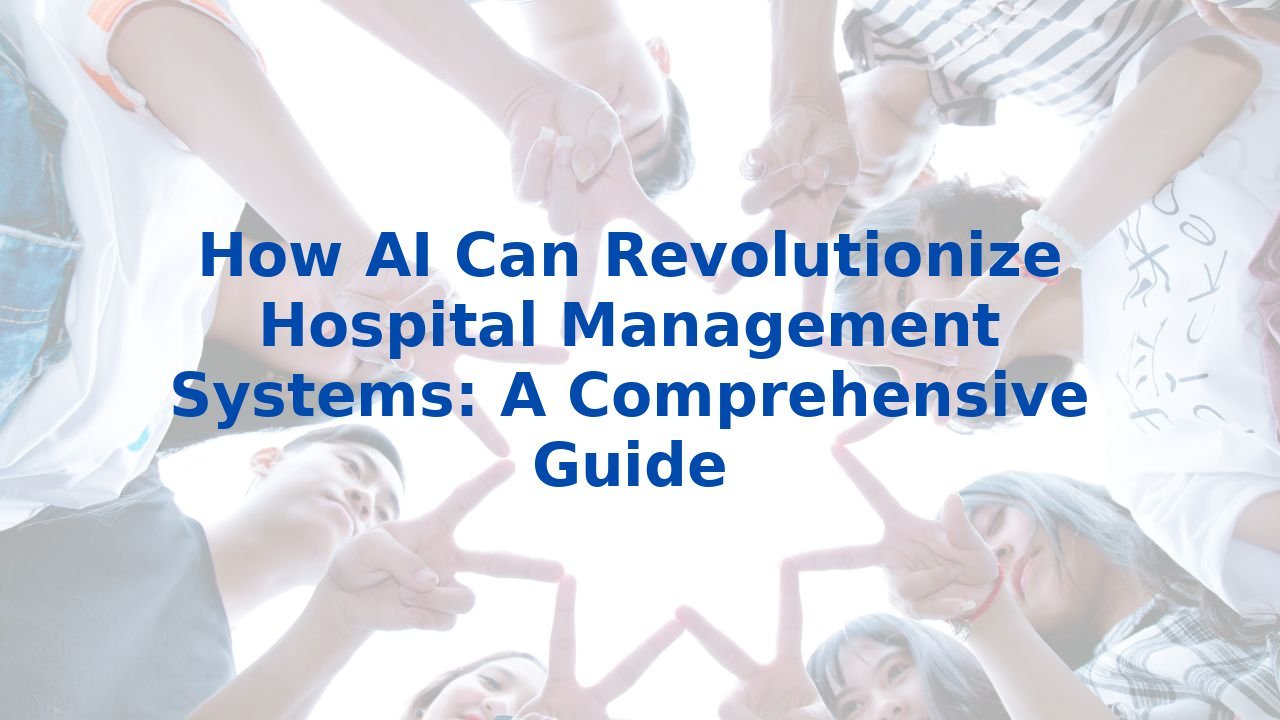How AI Can Revolutionize Hospital Management Systems: A Comprehensive Guide
How AI Can Revolutionize Hospital Management Systems: A Comprehensive Guide
Introduction
In a world where efficiency and patient care are of utmost importance, Hospital Management Systems (HMS) stand as the backbone of healthcare facilities. These systems are not merely software solutions; they are indispensable tools aimed at streamlining processes that range from patient management to billing and appointment scheduling. With the integration of Artificial Intelligence (AI), these systems are poised to undergo a profound transformation, enhancing operational efficiency and elevating patient care. This guide delves into the core business processes within HMS and illustrates how AI can be a game-changer in these operations.
General Business Processes of Hospital Management Systems
The backbone of any HMS lies in several critical processes:
- Patient Management
- Registration and Profile Management: Accurate storage of patient information, including medical histories, is ensured through various modules.
- Appointment Scheduling: An efficient system for booking appointments online reduces wait times, providing a seamless experience for patients.
- Electronic Health Records (EHR): EHRs are indispensable, allowing real-time updates and access to patient histories for healthcare professionals.
- Doctor and Staff Management
- Doctor Directory: Easily navigable directories help in optimizing appointment schedules, enhancing workflow.
- Staff Management: Efficient use of human resources is pivotal, and modules dedicated to this ensure effective staffing strategies.
- Billing and Financial Management
- Accounting and Billing: Streamlined financial transactions and billing enhance patient satisfaction and operational clarity.
- Inventory Management: Effective resource management, including medical supplies, ensures that operational continuity is maintained.
- Operational Efficiency
- Data-Driven Decision Making: Leveraging data analytics provides profound insights into patient characteristics and operational metrics.
- Automated Procedures: Automation minimizes human errors and enhances data security, significantly improving efficiencies.
How AI Enhances Hospital Management Systems
AI is not merely a technological advancement; it’s a transformative force. Here’s how it can supercharge various HMS components:
- Predictive Analytics: By analyzing historical data, AI can predict outcomes and identify high-risk patients, allowing for timely interventions.
- Chatbots and Virtual Assistants: These tools can manage patient queries and assist in administrative tasks, freeing up medical personnel to focus on patient care.
- Machine Learning for Diagnosis: Advanced algorithms analyze medical images and provide enhanced diagnostic insights, improving decision-making.
- Natural Language Processing (NLP): NLP streamlines documentation and enhances patient feedback analysis, refining the overall patient experience.
- Integration with Wearable Devices: Real-time data from wearables empowers healthcare professionals to monitor patients effectively and detect health issues early.
Benefits of AI for Improving Efficiency
The incorporation of AI into HMS generates a multitude of benefits that resonate through the organization:
- Enhanced Accuracy: The potential for human error is minimized, leading to improved decision-making and resource management.
- Increased Efficiency: Time saved from repetitive administrative tasks can be redirected towards patient care, enriching the healthcare experience.
- Improved Patient Experience: Immediate responsiveness through AI tools enhances patient satisfaction and trust in the healthcare system.
- Data Security: AI continually identifies and mitigates potential vulnerabilities, safeguarding sensitive patient information.
The Importance of Training Employees for AI
The journey to effective AI integration begins with education and training. Empowering employees with AI-related skills is pivotal. Consider the following:
- Understanding AI Tools: Knowledge of how to leverage AI tools in daily operations is essential for maximizing their utility.
- Data Interpretation: Training promotes the ability to interpret AI-generated data, ensuring informed decisions that benefit patient care.
- Adaptability: As AI evolves, continuous training fosters an adaptable workforce capable of embracing new technologies.
- Ethical Considerations: An understanding of ethical issues surrounding AI helps mitigate risks and guides responsible usage in patient care.
Conclusion
The evolution of Hospital Management Systems through AI integration is not just a trend; it’s a necessity for enhancing operational efficiency and patient care. To harness the full potential of AI, healthcare organizations must invest in training their workforce. By committing to education and proactive adaptation, they can unlock a future where technology and human expertise converge to create extraordinary patient experiences and streamlined operations.
If you're considering harnessing the power of AI in your healthcare facility, prioritizing AI training is the first step towards an efficient and effective transformation.



